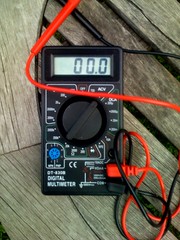
 A multimeter is an instrument that, true to its name, measures a number of different aspects of electricy and electronics: voltage, resistance, capacitance, frequency, conductance, inductance, and others.
A multimeter is an instrument that, true to its name, measures a number of different aspects of electricy and electronics: voltage, resistance, capacitance, frequency, conductance, inductance, and others.
If you are a geek, and don’t have a multimeter, you need to get one.
Beyond insuring that you maintain your non-techie friends’ and family members’ awe of you, what exactly can you do with a multimeter? The number one use I’ve found, and it’s terribly non-technical, is to test electrical wires when doing work around the house. It’s all well and good to shut off the breaker, but if you want to be absolutely sure it just takes a second to use your multimeter. Here are some other uses:
- Test batteries to see if they’re still good
- Ensure the connection integrity of soldered components
- Determine whether electrical or electronic cords are broken inside the insulation
- Ascertain the value of unknown resistors
Needless to say, multimeters can be a bit intimidating to use if you’re not familiar with electronic terminology. The good news is that there are many informational sites out there. Here are three:
- Hacker and MAKE contributor Ladyada has a nice ongoing multimeter tutorial.
- There is a half-hour video tutorial on the Tangentsoft web site.
- MAKE magazine has a vlog entry by Joe Grand of Defcon 15 badge fame.
But the first step, if you don’t have a multimeter, is to get one. The good news is that typically they’re very inexpensive, at least at the low end. The Mastech M300
is a good solid model, middle of the road. Not to fancy or expensive, but solid in its performance. For hard core hackers there is the Extech Instruments EX330 Autoranging MultiMeter

Get started measuring!
Edit: A reader suggested Fluke multimeters. Here’s a link to one: Fluke Corporation 73-3 Series III 600-Volt Digital Multimeter
